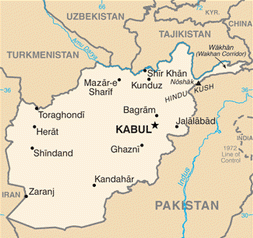Pursuant to the deal reached by Kabul and Washington for drawing down the war in Afghanistan, U.S. soldiers are now statutorily required to obtain a warrant before entering Afghan homes.
 The Obama administration, desperate to come to an agreement and extricate itself from the failed war, reluctantly agreed to Karzai’s demand to have greater Afghan control and a judge’s permission over night raids, a central military policy throughout the war.
The Obama administration, desperate to come to an agreement and extricate itself from the failed war, reluctantly agreed to Karzai’s demand to have greater Afghan control and a judge’s permission over night raids, a central military policy throughout the war.
But earlier indications suggested this development in policy was not was it sounded like. Pentagon spokesman Capt. John Kirby told reporters in April that ““It’s not about the U.S. ceding responsibilities to the Afghans.”
Kirby said, contrary to reports, that Afghan President Hamid Karzai will not hold “a veto” over future night raids and although U.S. forces will need a warrant going forward, “In practical terms, not much has changed.”
“It defines it fairly narrowly, and leaves open the possibility of a counterterrorism raid conducted by a CIA paramilitary group or other unit,” said Lisa Curtis, a South Asia specialist at the Heritage Foundation, a conservative Washington think tank. “That’s not to say those operations will occur regularly … but it stands to reason that if the United States had a very high-value target in its sights, it would pursue that target as it needed to.”
While U.S. officials won’t say it explicitly, mindful of the delicate diplomatic process, the agreement will be largely ignored. “If there’s a threat to the homeland, the United States always reserves the ability to act unilaterally,” said Rick “Ozzie” Nelson, senior fellow at the Center for Strategic and International Studies. “The rhetoric may not line up with that, however, because we have the need for an agreement with the Afghan government beyond 2014,” when U.S. combat forces are scheduled to leave.
Of course, what qualifies as a “threat to the homeland” is up to the administration, Joint Special Operations Command and the CIA, who typically have carried out the night raids. Night raids are one of the most hated aspects of the U.S. occupation in Afghanistan, infamously fueling resentment and often ending with the killing or arrest of innocents.
A similar warrant-based system was enacted by the U.S. military and Iraqi government during the closing months of the Iraq War, but statements from military officials reveal this is more a public appearance than a practical constrain.
Marine Gen. John Allen, the International Security Assistance Force commander, in reference to the Iraqi warrant system, said, “That system was successful, but it was successful because we were able to streamline the judicial process in ways that supported the operations rather than impeded the operations.”
The U.S. combat presence in Afghanistan will remain significant well beyond the supposed withdrawal date of 2014. Night raids will be a big part of that continuing operational presence and although they might have the semblance of Afghan sovereignty behind them, they will still be U.S.-led and they will still be a serious abuse of the Afghan people.


